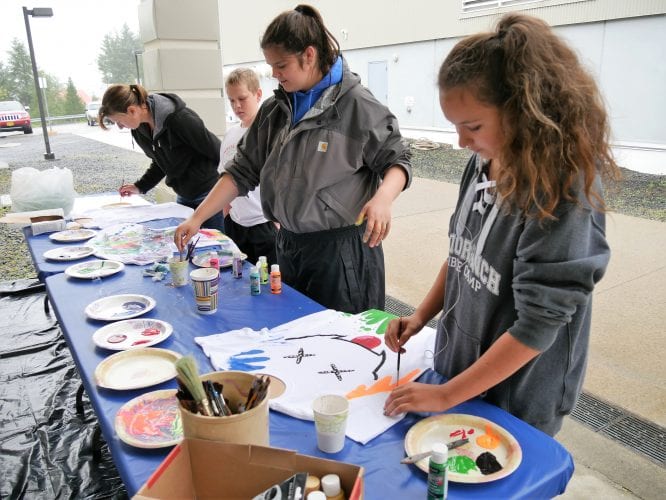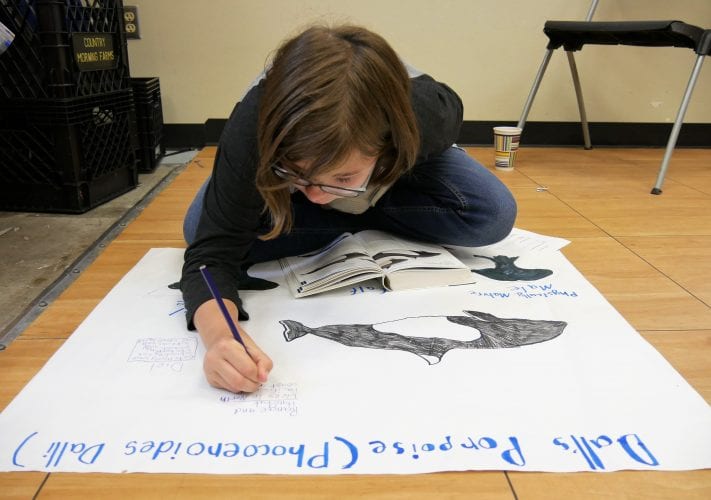
Petersburg teens paint camp t-shirts along with Kelly Bacos with the Petersburg Marine Mammal Center. (Photo by Angela Denning/KFSK)
This week has been packed with science based activities, most of it out in the field. Students went whale watching, camped out and looked for bats, beached combed, and explored mountain lakes. Here on the final day of camp, they’re bringing new knowledge and research skills indoors to a room at the community center. It’s a busy place, students are coming and going –outside to paint camp t-shirts and inside to prepare presentations on different species. They’re also identifying plants that they’ve gathered.
7th grader Brianna Ratliff is getting help from Sunny Rice to look up a leaf she’s brought back from the group’s trip to Three Lakes. Rice is a board member with the Petersburg Marine Mammal Center and helped develop the camp. They’re thumbing through a plant book trying to match the leaf.
Down the table, 12-year-old Isaac Litser puts the finishes touches to his presentation on deer fern. He’s creating a poster with information about the plant and has a branch to go with it.
“They’re called deer ferns because they are important winter food for deer and elk because they stay green and are still up in the winter,” Litster said.
“And why did you choose to do this for a project?” I ask him.
“Mostly because I find ferns interesting and this is a new fern that I just learned in science camp the last couple days so I was excited to learn more about it,” he said.
Litster says his favorite part of the week was learning about the muskeg, especially walking around Three Lakes loop.
“Most of the environment here and habitats here is mainly muskeg and so learning about that was interesting and then seeing the different creatures,” Litster said. “I learned about lots of new plants, just really cool, fun time.”
Nearby by on the floor, Samara Olson is writing on her poster with a blue colored pencil. She’s also 12.

12-year-old Samara Olson works on her poster of Dall’s Porpoise in science camp hosted by the Petersburg Marine Mammal Center, Aug. 13-17. (Photo by Angela Denning/KFSK)
“I’m doing a report on the Dall’s Porpoise. They’re very interesting creatures and I’ve seen them a lot when I go out boating and fishing and camping,” Olson said. “A lot of people think of them as more of an oceanic dolphin than a coastal porpoise because they like deeper waters.”
“And how can you identify them?” I ask her.
“They are a little more unproportional than the other ones, they’re a little bigger, and they have a very distinct tail,” Olson said. “The males can grow to almost eight feet long and the females grow up to six to seven feet.”
Back at the table Sunny Rice and Brianna Ratliff continue their investigation of the mystery leaves.
“We had to consult our botanist friend via iphone message,” Rice said, laughing.
“Did you get a response yet?” I ask them.
“Not yet but we’re going to press them in the meantime,” Rice said.
The camp includes many science professionals from Petersburg and the region to help teach the teenagers.
The non-profit Petersburg Marine Mammal Center has been around for over 20 years. Volunteers there respond to entangled marine mammals and also seek to educate the community about science.









